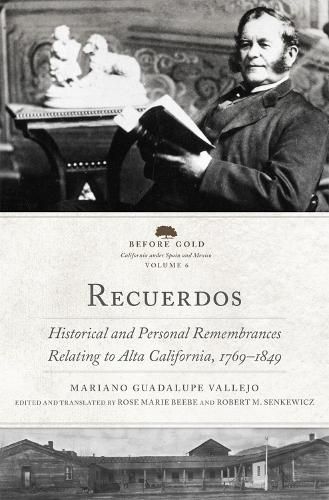Readings Newsletter
Become a Readings Member to make your shopping experience even easier.
Sign in or sign up for free!
You’re not far away from qualifying for FREE standard shipping within Australia
You’ve qualified for FREE standard shipping within Australia
The cart is loading…






A generation after the U.S. conquest of California, Mariano Guadalupe Vallejo set out to write the story of the land he knew so well-a history to dispel the romantic vision quickly overtaking the state's recent past. The five-volume history he produced, published here for the first time in English translation, is the most complete account of California before the gold rush by someone who resided in California at the time.
Mariano Guadalupe Vallejo (1807-90) grew up in Spanish California, became a leading military and political figure in Mexican California, and participated in some of the founding events of U.S. California, such as the Monterey Constitutional Convention and the first legislature. With his project, undertaken for historian and publisher Hubert Howe Bancroft, Vallejo sought to correct misrepresentations of California's past, which dismissed as insignificant the pre-gold rush Spanish and Mexican periods-conflated into one "Mission era."
Instead, Vallejo's history emphasized the role of the military in the Spanish colonization of California and argued that the missionaries after JunIpero Serra, with their medieval ideas, had actually retarded the development of California until secularization in the early 1830s. Culture, he contended, was of intense interest to the Californio people, as was the education of children. His accounts of Indigenous peoples, while often sympathetic, were also characteristic of his time: he and other California military leaders, Vallejo maintained, had successfully subdued "hostile" Indians and established mutually beneficial relationships with others.
Out of keeping with Bancroft's American triumphalism, Vallejo's monumental project was consigned to the archives. With their deft translation and commentary, Rose Marie Beebe and Robert M. Senkewicz-authors of a companion volume on Vallejo's work-have brought to light a remarkable perspective, often firsthand, on important events in early California history. Their efforts restore a critical chapter to the story of California and the American West.
$9.00 standard shipping within Australia
FREE standard shipping within Australia for orders over $100.00
Express & International shipping calculated at checkout
A generation after the U.S. conquest of California, Mariano Guadalupe Vallejo set out to write the story of the land he knew so well-a history to dispel the romantic vision quickly overtaking the state's recent past. The five-volume history he produced, published here for the first time in English translation, is the most complete account of California before the gold rush by someone who resided in California at the time.
Mariano Guadalupe Vallejo (1807-90) grew up in Spanish California, became a leading military and political figure in Mexican California, and participated in some of the founding events of U.S. California, such as the Monterey Constitutional Convention and the first legislature. With his project, undertaken for historian and publisher Hubert Howe Bancroft, Vallejo sought to correct misrepresentations of California's past, which dismissed as insignificant the pre-gold rush Spanish and Mexican periods-conflated into one "Mission era."
Instead, Vallejo's history emphasized the role of the military in the Spanish colonization of California and argued that the missionaries after JunIpero Serra, with their medieval ideas, had actually retarded the development of California until secularization in the early 1830s. Culture, he contended, was of intense interest to the Californio people, as was the education of children. His accounts of Indigenous peoples, while often sympathetic, were also characteristic of his time: he and other California military leaders, Vallejo maintained, had successfully subdued "hostile" Indians and established mutually beneficial relationships with others.
Out of keeping with Bancroft's American triumphalism, Vallejo's monumental project was consigned to the archives. With their deft translation and commentary, Rose Marie Beebe and Robert M. Senkewicz-authors of a companion volume on Vallejo's work-have brought to light a remarkable perspective, often firsthand, on important events in early California history. Their efforts restore a critical chapter to the story of California and the American West.